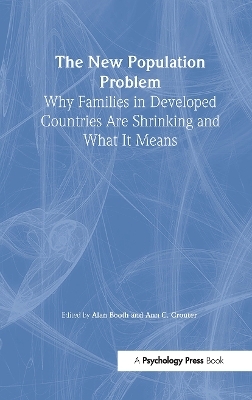
The New Population Problem
Psychology Press (Verlag)
978-0-8058-4978-3 (ISBN)
- Titel z.Zt. nicht lieferbar
- Versandkostenfrei innerhalb Deutschlands
- Auch auf Rechnung
- Verfügbarkeit in der Filiale vor Ort prüfen
- Artikel merken
This book is based on the presentations and discussions from a national symposium on "Creating the Next Generation: Social, Economic, and Psychological Processes Underlying Fertility in Developed Countries," held at the Pennsylvania State University in 2003. The papers address some of the antecedents and consequences of the recent steep declines in fertility in developed countries from different theoretical and disciplinary angles. While fertility rates are still high in some less-developed parts of the world, the new population problem with many countries in Europe, Asia, and North America is declining fertility. With fertility decline comes a reshaping of the population pyramid. The topic of fertility decline is interesting not only at the level of the individuals and couples, but also at the level of the societies that must come to grips with their long-term implications.
Divided into four Parts, the text:
*looks at contemporary trends in U.S. fertility, thus setting the stage for the entire volume;
*discusses social and cultural values and attitudes;
*analyzes fertility decisions in different countries; and
*focuses on the possible long-term consequences of current fertility trends for individuals, families, and societies.
Alan Booth (Edited by) , Ann C. Crouter (Edited by)
Contents: Preface. Part I: Contemporary Patterns and Trends in U.S. Fertility: Where Have We Come From, and Where Are We Headed?S.P. Morgan, K. Hagewen, Is Very Low Fertility Inevitable in America? Insights and Forecasts From an Integrative Model of Fertility. R.K. Raley, The Role Of Nonmarital Births in Sustaining Replacement Fertility in the United States. M.B. Tucker, When the Rule Applies: Commentary on "Is Very Low Fertility Inevitable in America?" S.M. Bianchi, Time and Money: Market Work, Nonmarket Work, Gender Equality, and Fertility. Part II: How Do Social and Cultural Values and Attitudes Shape Fertility Patterns in the Developed World?J.S. Barber, W.G. Axinn, How Do Attitudes Shape Childbearing in the United States? S. Lundberg, Childbearing Decisions: Can Attitude Measures Play a Role in Casual Modeling? H-P. Kohler, Attitudes and Low Fertility: Reflections Based on Danish Twin Data. D.F. Alwin, Attitudes, Beliefs, and Childbearing. Part III: How and Why Is Fertility Tied to Marriage--Or Not?E. Thompson, Partnerships and Parenthood: A Comparative View of Cohabitation, Marriage, and Childbearing. S. Jaffee, Partnership Stability and Marital Outcomes in a Representative UK Sample. H.B. Presser, The Importance of Gender Relations for Understanding Low Fertility and Single Motherhood. N.S. Landale, The Changing Partnership Context of Parenthood: Where Do Researchers Go From Here? Part IV: What Are the Long-Term Consequences of Current Fertility Trends for Individuals, Families, and Society.C. Bachrach, R. King, A. Yuan, Children as Private and Public Goods: Implications of Fertility Trends. L. White, Creating the Next Generation: Whose Responsibility? D.T. Lichter, J. Wooton, The Concentration of Reproduction in Low-Fertility Societies: The Case of the United States. Panel Discussion: W.G. Axinn, C. Bachrach, J.S. Barber, D. Lichter, S.P. Morgan, E. Thomson, L. White, The Future of Low Fertility. T. St. Pierre, J.K. Dariotis, Understanding Low Fertility: The Impact of Life-Course Competition on Fertility Behavior in Developed Nations.
| Erscheint lt. Verlag | 18.5.2005 |
|---|---|
| Reihe/Serie | Penn State University Family Issues Symposia Series |
| Verlagsort | Philadelphia |
| Sprache | englisch |
| Maße | 152 x 229 mm |
| Gewicht | 544 g |
| Themenwelt | Sozialwissenschaften ► Soziologie ► Empirische Sozialforschung |
| ISBN-10 | 0-8058-4978-5 / 0805849785 |
| ISBN-13 | 978-0-8058-4978-3 / 9780805849783 |
| Zustand | Neuware |
| Haben Sie eine Frage zum Produkt? |
aus dem Bereich


